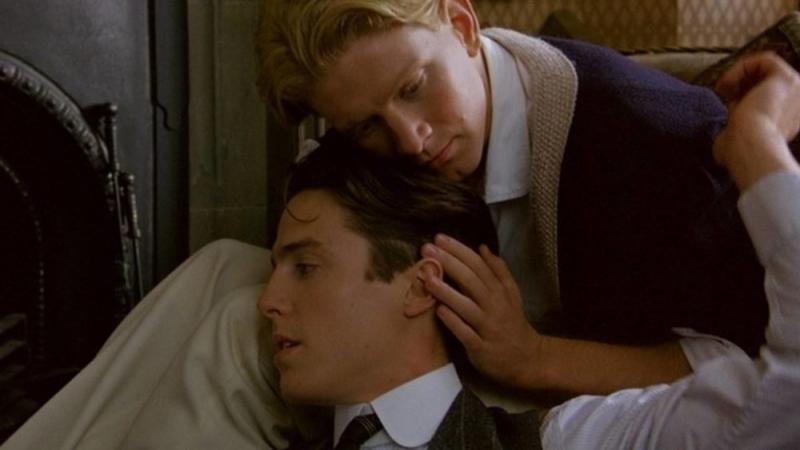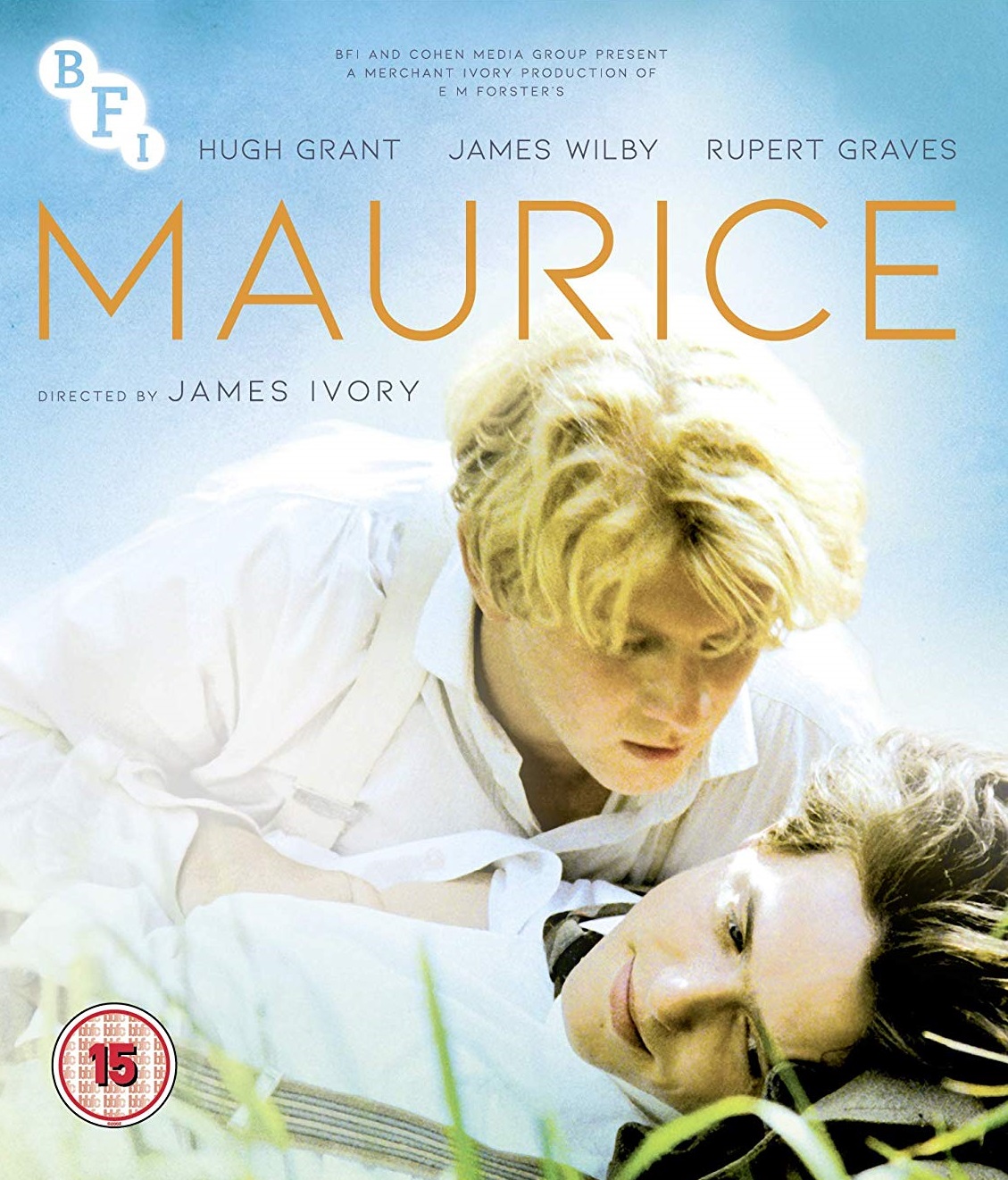DVD/Blu-ray: Maurice | reviews, news & interviews
DVD/Blu-ray: Maurice
DVD/Blu-ray: Maurice
Merchant Ivory's celebrated EM Forster adaptation hits home with new maturity

“Publishable, but worth it?” EM Forster’s hesitations about the value of Maurice, his novel of Edwardian homosexuality – written in 1913-14, it was published only posthumously, in 1971 – were certainly redeemed by James Ivory’s 1987 film of the book.
In that wider context of history, Maurice now comes across as a key early work of gay-themed cinema (the concurrent run-away success, in that 2017 rerelease year, of Luca Guadagnino’s Call Me By Your Name, which was scripted by Ivory, somehow brought that thematic point home nicely). But if the luscious beauty, not to mention Italian settings, of Guadagnino’s film strike any visual chord, it’s surely with Merchant Ivory’s previous film, A Room with a View (1985). That had been the first film adaptation allowed by the trustees of Forster’s estate, King’s College, Cambridge, who seemed surprised, Ivory recalls in an interview here, by their suggestion for its successor: the apparently more “suitable” Howard’s End would follow, of course, in 1992.
 The much more sombre palette of Maurice looks all the more poignantly considered now, for all its relish of familiar visual attractions like the idylls of the Cambridge undergraduate world or the confident luxuriance of pre-WWI country-house life. Returning to Forster’s story more than a century after it was written brings home how much such tropes weave themselves into the work of later writers as varied as LP Hartley and Alan Hollinghurst, as well as how artfully Merchant Ivory, with their plentiful details – the leaking roofs, the closing shutters – hint at the ending of an epoch.
The much more sombre palette of Maurice looks all the more poignantly considered now, for all its relish of familiar visual attractions like the idylls of the Cambridge undergraduate world or the confident luxuriance of pre-WWI country-house life. Returning to Forster’s story more than a century after it was written brings home how much such tropes weave themselves into the work of later writers as varied as LP Hartley and Alan Hollinghurst, as well as how artfully Merchant Ivory, with their plentiful details – the leaking roofs, the closing shutters – hint at the ending of an epoch.
Watching Maurice again today confirms the impressive, unflamboyant accomplishment with which Ivory handies his story, its substantial 140 minutes never overstaying their welcome. The pairing of Wilby and Grant – the latter, especially, strikingly youthful here – is so natural that it’s a shock to learn that the film was nearly closed down when the actor originally cast as Maurice (Julian Sands, fresh from A Room with a View) walked away weeks before production was due to start, and it had to be re-assembled at the last minute. This BFI release comes with generous supplementary material covering such context, including three interviews with Ivory (the main one is the 40-minute Maurice: A Director's Perspective hosted by Tom McCarthy, director of Spotlight). There’s a conversation from 2019 with James Wilby (who had also then recently directed a London stage adaptation of the novel), as well as a brief snatch of him and Hugh Grant in conversation from the BFI 2018 Flare festival.
The key extra here, however, is a 39-minute run-through of the film’s deleted scenes with indispensable elucidation supplied by film academic Claire Monk, who also contributes the full audio commentary that comes with the Blu-ray edition, as well as a lengthy booklet interview with Wilby. The Merchant Ivory team made Maurice without its regular writing collaborator, Ruth Prawer Jhabvala, the script the work of Kit Hesketh-Harvey and Ivory himself. Their main addition to the source novel was an early scene in which we see Maurice and Clive’s flamboyant Cambridge contemporary Risley arrested for consorting with a guardsman: his trial results in his ruin, making clear how society prohibited and persecuted homosexuality at the time.
But the original script was fashioned very differently, involving extensive intercutting and flashbacks, and much more complex in structure than the simpler linear narrative that Maurice finally found. Monk’s assembly and explanation of such unused material – the Risley epsiodes were expanded, while the most significant element was a strand involving Maurice’s passion for a younger man (Adrian Ross Magenty, who went on to play Tibby in Howard’s End) – fascinates. The way that it follows ideas from germination through development to their final form is revelatory, a glimpse into the cinematic process itself.
Watch the trailer for Maurice
rating
Share this article
The future of Arts Journalism
You can stop theartsdesk.com closing!
We urgently need financing to survive. Our fundraising drive has thus far raised £49,000 but we need to reach £100,000 or we will be forced to close. Please contribute here: https://gofund.me/c3f6033d
And if you can forward this information to anyone who might assist, we’d be grateful.

Subscribe to theartsdesk.com
Thank you for continuing to read our work on theartsdesk.com. For unlimited access to every article in its entirety, including our archive of more than 15,000 pieces, we're asking for £5 per month or £40 per year. We feel it's a very good deal, and hope you do too.
To take a subscription now simply click here.
And if you're looking for that extra gift for a friend or family member, why not treat them to a theartsdesk.com gift subscription?
more Film
 The Mastermind review - another slim but nourishing slice of Americana from Kelly Reichardt
Josh O'Connor is perfect casting as a cocky middle-class American adrift in the 1970s
The Mastermind review - another slim but nourishing slice of Americana from Kelly Reichardt
Josh O'Connor is perfect casting as a cocky middle-class American adrift in the 1970s
 Springsteen: Deliver Me From Nowhere review - the story of the Boss who isn't boss of his own head
A brooding trip on the Bruce Springsteen highway of hard knocks
Springsteen: Deliver Me From Nowhere review - the story of the Boss who isn't boss of his own head
A brooding trip on the Bruce Springsteen highway of hard knocks
 The Perfect Neighbor, Netflix review - Florida found-footage documentary is a harrowing watch
Sundance winner chronicles a death that should have been prevented
The Perfect Neighbor, Netflix review - Florida found-footage documentary is a harrowing watch
Sundance winner chronicles a death that should have been prevented
 Blu-ray: Le Quai des Brumes
Love twinkles in the gloom of Marcel Carné’s fogbound French poetic realist classic
Blu-ray: Le Quai des Brumes
Love twinkles in the gloom of Marcel Carné’s fogbound French poetic realist classic
 Frankenstein review - the Prometheus of the charnel house
Guillermo del Toro is fitfully inspired, but often lost in long-held ambitions
Frankenstein review - the Prometheus of the charnel house
Guillermo del Toro is fitfully inspired, but often lost in long-held ambitions
 London Film Festival 2025 - a Korean masterclass in black comedy and a Camus classic effectively realised
New films from Park Chan-wook, Gianfranco Rosi, François Ozon, Ildikó Enyedi and more
London Film Festival 2025 - a Korean masterclass in black comedy and a Camus classic effectively realised
New films from Park Chan-wook, Gianfranco Rosi, François Ozon, Ildikó Enyedi and more
 After the Hunt review - muddled #MeToo provocation
Julia Roberts excels despite misfiring drama
After the Hunt review - muddled #MeToo provocation
Julia Roberts excels despite misfiring drama
 Ballad of a Small Player review - Colin Farrell's all in as a gambler down on his luck
Conclave director Edward Berger swaps the Vatican for Asia's sin city
Ballad of a Small Player review - Colin Farrell's all in as a gambler down on his luck
Conclave director Edward Berger swaps the Vatican for Asia's sin city
 London Film Festival 2025 - Bradley Cooper channels John Bishop, the Boss goes to Nebraska, and a French pandemic
... not to mention Kristen Stewart's directing debut and a punchy prison drama
London Film Festival 2025 - Bradley Cooper channels John Bishop, the Boss goes to Nebraska, and a French pandemic
... not to mention Kristen Stewart's directing debut and a punchy prison drama
 London Film Festival 2025 - from paranoia in Brazil and Iran, to light relief in New York and Tuscany
'Jay Kelly' disappoints, 'It Was Just an Accident' doesn't
London Film Festival 2025 - from paranoia in Brazil and Iran, to light relief in New York and Tuscany
'Jay Kelly' disappoints, 'It Was Just an Accident' doesn't
 Iron Ladies review - working-class heroines of the Miners' Strike
Documentary salutes the staunch women who fought Thatcher's pit closures
Iron Ladies review - working-class heroines of the Miners' Strike
Documentary salutes the staunch women who fought Thatcher's pit closures
 Blu-ray: The Man in the White Suit
Ealing Studios' prescient black comedy, as sharp as ever
Blu-ray: The Man in the White Suit
Ealing Studios' prescient black comedy, as sharp as ever

Add comment